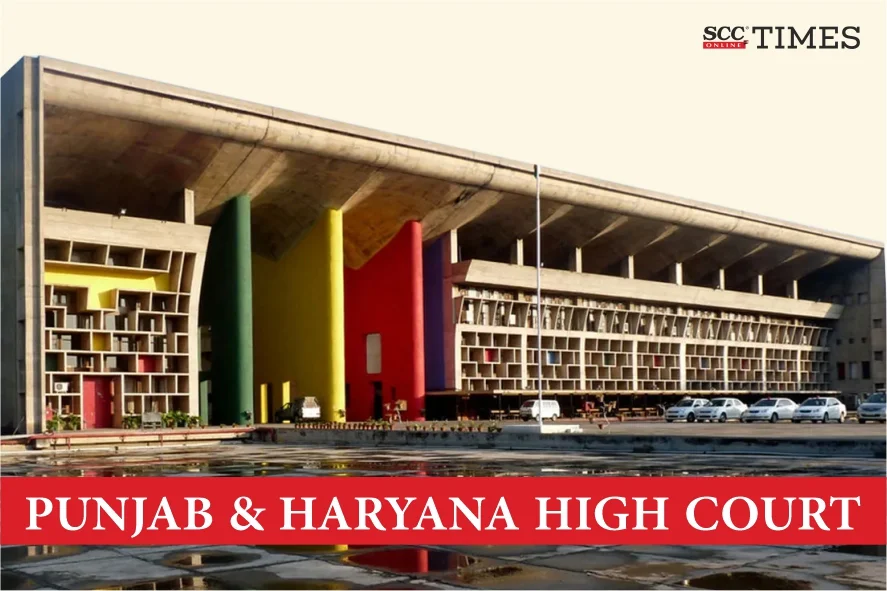Punjab and Haryana High Court: In a significant decision regarding the contentious 2004 Haryana Civil Services (Executive Branch) recruitment, a Division Bench comprising Sanjeev Prakash Sharma* and Meenakshi I. Mehta*, JJ. delivered a split verdict regarding allegations of irregularities in the selection process and discriminatory denial of appointment and referred the matter to a larger bench.
Background
In 2004, the Haryana Public Service Commission issued an advertisement to fill ‘58’ posts in the Haryana Civil Services (Executive Branch) and ‘44’ in allied services. The appellant was selected and recommended for an appointment. However, a Vigilance Bureau inquiry revealed discrepancies in the answer sheets regarding the use of different inks by examiners.
While some candidates with similar irregularities were appointed, appellant was declared “tainted” and denied appointment. He challenged this classification, arguing that the use of different inks was not evidence of fraud, especially as the FSL confirmed that the same examiner made the markings.
Justice Sanjeev Prakash Sharma’s Decision
He allowed the plea and opined that arbitrary exercise had been conducted by the respondents while carrying out the duties of examining the case of candidates as directed by the Division Bench of this Court and the Supreme Court. It stated that executive authorities have to exercise their power fairly and without discrimination.
He further opined that the committee arbitrarily cherry-picked certain candidates by adopting the “pick and choose method” with similar answer sheet discrepancies, appointing them while excluding the appellant. The Court noted that the answer sheets of those candidates who have been appointed also carry two different inks of the same examiner who has examined the answer sheet of the appellant.
The Court pointed out that the examiner had made markings with one pen while examining the answers; however, on the front page, he had used another ink and also put in his signatures. Furthermore, the Court found that no forgery had been found by FSL, nor was there any ambiguity. No doubt, therefore, could be raised about the authenticity of the answer copy.
He opined that, therefore, cannot turn back and hold that the revival could not have been done. The principle of res-judicata herefore cannot turn back and hold that the revival could not have been done. The principle of res-judicata erefore cannot turn back and hold that the revival could not have been done. The principle of res-judicata essentially would apply where there is a same cause of action which has arisen and was decided on merits in an earlier litigation between the same parties.”
Allowing the appeal, he directed the respondents to offer the appointment to the appellant.
The state was further directed to offer appointment to the appellant with notional seniority, pay fixation, and all service benefits.
Justice Meenakshi I. Mehta’s Decision
Dissenting, she dismissed the appeal and held that the appellant failed to contest his tainted status earlier and had not reserved his right to appeal, undermining his current claim.
She pointed out differences in handwriting between appellant’s Hindi and Hindi Essay papers and other subjects. Article 14 cannot be invoked to justify illegality, and mere similarity with other appointees does not grant automatic parity. Emphasising judicial discipline, it was held that the State Vigilance Bureau’s findings and the committee’s conclusions had been duly considered and were not perverse. The Court referred to the judgment of Ashok Kumar Yadav v. State of Haryana and Surendra Narain Singh v. State of Bihar, (1985) 4 SCC 417 and clarified that factual parity must be based on substance, not form.
She noted that there was nothing in the impugned order of the Single Judge to suggest that the writ-petitioner had ever sought to reserve his right to file an appeal against the same.
Further, stated that it is quite explicit that the writ petitioner, even after having been categorised as a tainted candidate, had chosen not to agitate/contest his above-referred appeal on merits and has opted consideration of his claim.
She found the contentions devoid of any merit as the chart obtained findings from the inquiry report in respect of the 102 selected candidates and the name of the writ petitioner mentioned at Sr. No. 20 in the same and the findings as recorded.
Further, the Court stated that different ink used for marking the front page makes it crystal clear that besides different ink has been used for marking the front page on the table of marks and the signature of the examiner, secondly, the Court also pointed out that handwriting of the marking in the answer sheets of the Hindi and Hindi essay of the writ petitioner being different from the handwriting of the marking of the other answer sheets had also been founded/noticed.
The petitioner’s claim for parity with five appointed candidates was rejected, citing that even if the petitioner’s case was similar, the presence of discrepancies in 22 answer sheets disqualified them from seeking relief. She found no merit in the LPA and dismissed the appeal, reiterating that equality cannot be claimed to repeat or justify irregularities. The rejection of the petitioner’s representation was also based on a thorough consideration of all relevant factors. The petitioner failed to provide evidence of bias, malice, or mala fides on the part of the respondents.
Due to the differing opinions, the Court referred the matter to the Chief Justice to constitute a Larger Bench for the final decision.
[Surender Lather v. State of Haryana, 2025 SCC OnLine P&H 3038, decided on 29-05-2025]
Advocates who appeared in this case :
For the petitioner: Chetan Mittal, Himanshu Gupta, Avichal Sharma, Vivek Chauhan
For the respondent: Kanwal Goyal, Sheena Dhaia


